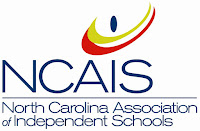 Last night Gaston Day School had its annual poetry slam. Kathryn Rhyne and Nana Boateng, associate editors of Blutopia, organized the event. There was a great crowd in the library, and everyone snapped their fingers after poems were read. I read a poem from Elizabeth Seydel Morgan called "The Last Poem," which describes beautifully how someone who is attending a poetry reading can let their mind wander accidentally because they are tired of listening to so many poems. After all, this is "the last poem" in a night full of many, many readings. Boredom sets in, the attention span has been overtaxed, and suddenly the listener is no longer connected to the poem, but instead is lost in other thoughts. Morgan's images in the poem are rich and evocative.
Last night Gaston Day School had its annual poetry slam. Kathryn Rhyne and Nana Boateng, associate editors of Blutopia, organized the event. There was a great crowd in the library, and everyone snapped their fingers after poems were read. I read a poem from Elizabeth Seydel Morgan called "The Last Poem," which describes beautifully how someone who is attending a poetry reading can let their mind wander accidentally because they are tired of listening to so many poems. After all, this is "the last poem" in a night full of many, many readings. Boredom sets in, the attention span has been overtaxed, and suddenly the listener is no longer connected to the poem, but instead is lost in other thoughts. Morgan's images in the poem are rich and evocative.
I have come to poetry both early and late in life. As a young boy, I liked to write poems. They were simple rhyming couplets, and they often involved gory subjects. But then as a teenager, I became embarrassed about my love of poetry, and I stopped writing or reading it. Sometime in my early thirties, I started reading good poetry again, and it has once again become important to me. I like poetry that reflects a strong sense of place. My favorite poets are Wendell Berry, Mary Oliver, Robert Morgan, and James Applewhite.
Applewhite, who grew up in Eastern North Carolina and teaches at Duke, may be the first poet as an adult who I felt directly connected to. His poetry is often set on tobacco farms. When I read it, I feel as if I am entering my father's world. Dad grew up on a farm here in Gaston County. When I read Applewhite's poems, it is almost as if my father is brought back to life and inhabits the poems.
I am primarily a non-fiction writer and, in particular, I write history. Even so, I occasionally write a sentence that strikes me as near poetry. In my book, A New South Hunt Club, I discuss a wealthy textile industrialist from Kings Mountain, named Freno Dilling, who used his money to organize a deer hunting club on Hilton Head Island. One of my favorite lines is, "More mills meant more money for Freno Dilling." The alliteration is obvious. But there is also some near internal rhyming. I just love saying that sentence over and over. "More mills meant more money for Freno Dilling.... More mills meant more money for Freno Dilling..... More mills meant more money for Freno Dilling." That sentence not only communicates meaning, it sounds so good!! I did not set out to write such a wonderful sentence. But I think my inner poet somehow brought together all those complimentary sounds and pauses.
If we have ears to hear, I suspect that there is poetry all around us in the spoken word. Whenever someone says something in a way that creates beautiful sounds and rhythms, isn't that simple poetry?
The Poetry Slam creates a space and occasion for our students to read their own poetry or that of others. The best of our student poetry finds its way into Blutopia. I am so glad that Gaston Day is a place that values and celebrates poetry.
